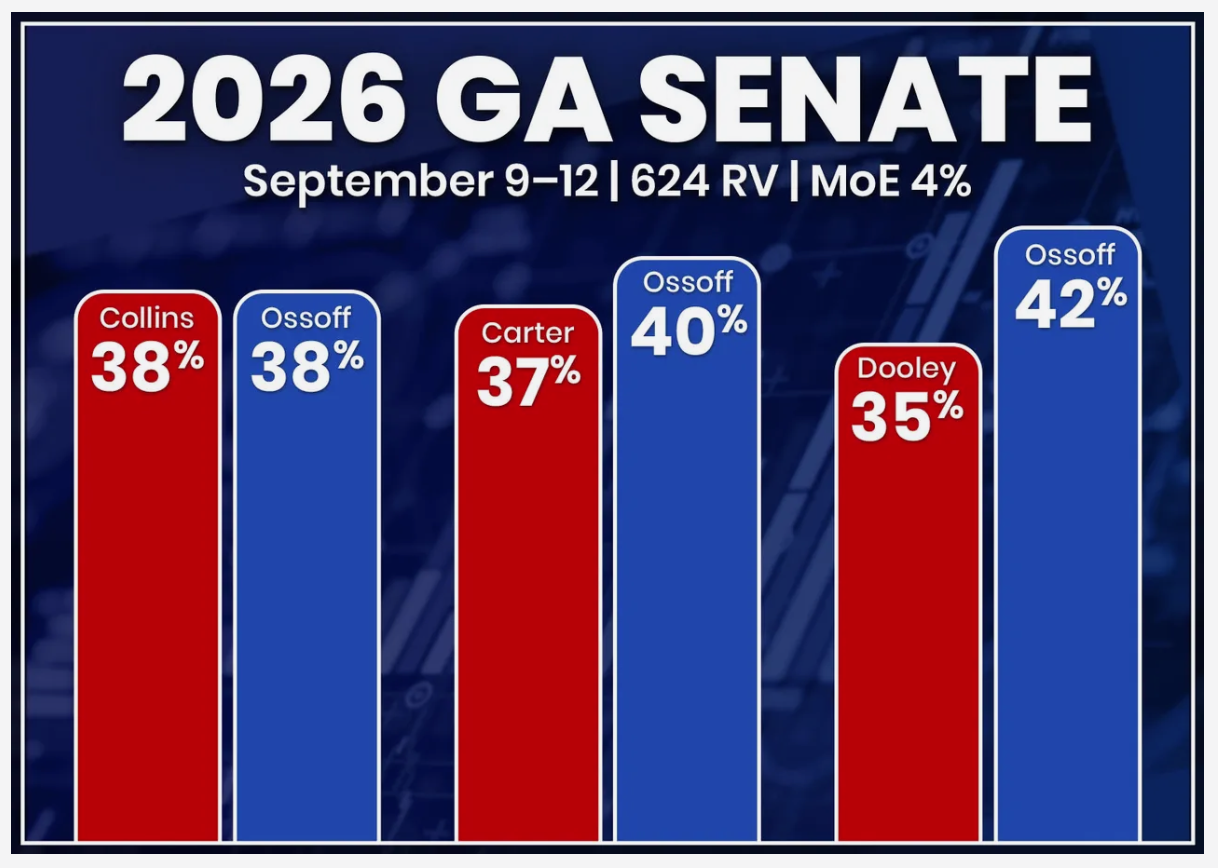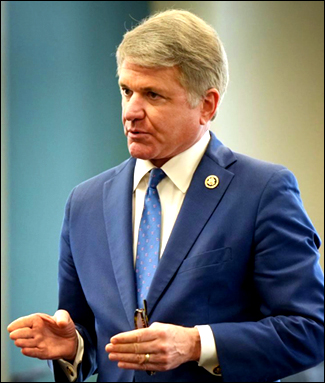
See 2026 Georgia Senate poll results: Quantas Insights.
By Jim Ellis — Friday, Sept. 19, 2025
Senate
As we know, the swing state of Georgia will be one of the key battleground 2026 US Senate domains, and a new statewide poll released earlier this week confirms the race will present challenges for both sides.

Georgia Democratic Sen. Jon Ossoff
According to the Quantus study (Sept. 9-12; 624 likely Georgia general election voters; online and text), Sen. Ossoff and Rep. Mike Collins (R-Jackson) are tied at 38 percent preference and Rep. Buddy Carter (R-Pooler/Savannah) trails the Senator, 37-40 percent. Former University of Tennessee football coach Derek Dooley, son of long-time University of Georgia football coach Vince Dooley, is definitively behind Sen. Ossoff trailing 42-35 percent.
While other polls have shown similarly close ballot tests, the Quantus survey is interesting in that it delves more deeply into issues and reveals that both eventual nominees will have challenges in attempting to forge a winning coalition.
For example, while President Trump scores a 49 percent job approval score, Sen. Ossoff posts 47 percent, yet the two are virtually diametrically opposed on the issue agenda. Furthermore, while Sen. Ossoff posts a 47:37 percent job approval index, only 36 percent of the same sampling universe believes he deserves re-election, and 49 percent believes it is “time for a change.”
In an overwhelming number (53 percent), the poll respondents cite the cost of living and inflation as the most important issue. Crime and public safety is second (13 percent), with jobs and the economy closely behind (12 percent). The number one response, however, for why costs are rising is President Trump’s tariffs and trade policies (41 percent). The Biden Administration economic policies were the second-most mentioned cause (27 percent).
When asked which party do the Georgia respondents trust more to handle the economic issues, 40 percent said the Democrats and only 39 percent answered Republicans. On bringing down the cost of living, it is again the Democrats holding a slight edge, 36-35 percent.
On crime, however, Republicans are more trusted, 42-29 percent. Same for immigration with a 48-28 percent Republican favorable split. By a 53-40 percent majority, the respondents favor the mass deportation policy, while only 31 percent support Ossoff’s border security position. A total of 76 percent support the crime prevention Laken Riley Act, a Republican bill that Sen. Ossoff supported.
An inconsistency appears when respondents are asked to list what they believe should be the next Senator’s priorities. In order, the responses were reducing taxes for working families (39 percent), cutting wasteful federal spending (24 percent), and reducing regulations that raise prices (21 percent). This is in line with the Republican message, but the sentiment is not fully translating to the Republican candidates, particularly among Independent voters.
While Sen. Ossoff is unopposed for the Democratic nomination, on the Republican side the Quantus poll found Rep. Collins leading Rep. Carter and Dooley, 25-20-7 percent. With a large undecided pool, this campaign will go down to the wire toward the May 19 primary. If no one receives 50 percent, the top two finishers will advance to a June 16 runoff election.
As a reminder for the general election, Georgia is one of two states that also features a runoff election if no candidate receives majority support in the November vote. The post-election runoff was forced in the past two Georgia Senate elections. If this situation presents itself again in 2026, the deciding runoff will be held on Dec. 1.
As is the case in virtually every election, messaging will be key. Republicans must find a way to relate what are typically Georgia voter issue positions directly to the party’s Senate candidate, while Sen. Ossoff must find ways to improve his electoral standing even though his job approval is relatively good. It is important to note that in this poll’s ballot tests, the Senator did not break 40 percent preference against any Republican.
Along with the Senate races in Michigan, North Carolina, and Texas, the Georgia Senate battle will be a premier 2026 electoral contest.






